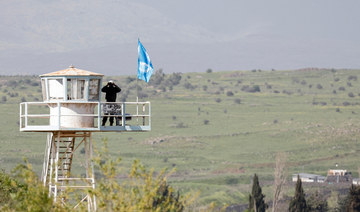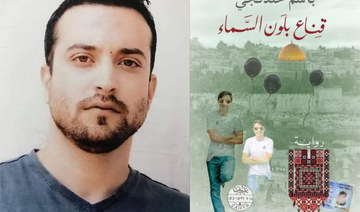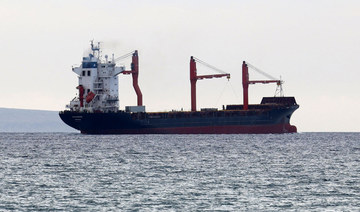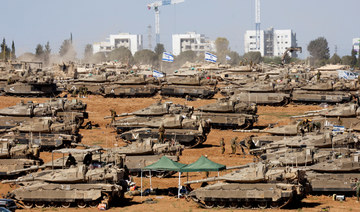QAMISHLI, Syria: Washington will “adjust” its delivery of weapons to an anti-terrorist alliance in Syria dominated by Kurdish fighters, Kurdish officials said on Monday, insisting that collaboration with the US will “continue.”
The comments come after Turkey said it had received assurances from the White House that it would halt supplies of weapons to the Kurdish People’s Protection Units (YPG), the main Kurdish militia in Syria.
The US began supplying weapons directly to the YPG earlier this year as part of its support for the anti-terrorist Syrian Democratic Forces (SDF) alliance, which is dominated by the Kurdish militia.
The decision deeply angered Ankara, which considers the YPG a “terrorist” group.
Foreign Minister Mevlut Cavusoglu said on Friday that US President Donald Trump had told Turkey the weapons deliveries would end.
“Mr Trump said he gave a clear order and that after this, weapons would not be supplied to the YPG, essentially he said this nonsense should have been ended earlier,” Cavusoglu said at a press conference in Ankara.
Washington was less explicit, however, describing only “pending adjustments” to its support for the YPG, which forms the backbone of the SDF that ousted the Daesh group from Raqqa last month.
Kurdish officials said on Monday that any changes to weapons deliveries were the natural consequence of their successes against Daesh, and not a reflection of any change in their ties with Washington.
“There are no changes to the relations between the Syrian Democratic Forces and the US administration,” said Abdel Karim Amr, an official with the Kurdish semi-autonomous administration in northern Syria.
“Obviously, there will be an adjustment in the delivery of arms to the SDF after the elimination of IS (Daesh), but there is no change in US policy regarding coordination” with the alliance, he added.
“The support will continue until we eliminate all that remains of IS’s presence in the entire region where there is coordination between the US administration and the SDF,” said Amr, who is charged with external relations for the Kurdish administration.
He described Turkey’s statements on the issue as “incorrect” and “imprecise.”
“We are the partners of the international coalition that is fighting terrorism, and that partnership will continue,” added Mustefa Bali of the SDF’s press office.
“We still have much to do with our partners in the coalition,” he added.
The SDF has been a key partner of the US-led coalition against Daesh, and together they have driven the terrorists from strongholds including their one-time de facto Syrian capital Raqqa.
But the relationship has caused tensions between Washington and Ankara, which launched its own military intervention in Syria last year targeting both Daesh and the YPG.
Turkish Deputy Prime Minister Bekir Bozdag said on Monday Washington must honor the pledge to end weapons provisions to the Kurdish fighters.
“The ‘We will not give weapons’ remarks from a US president for the first time is important, but it will lose value if it is not implemented. It would be deceiving the world,” Bozdag said.
Syria Kurds say US to ‘adjust’ weapons deliveries
Syria Kurds say US to ‘adjust’ weapons deliveries

Measured support for end of UN mission in Iraq

UNITED NATIONS: Several members of the UN Security Council, including Russia and China, on Thursday backed Baghdad’s request for the world body’s political mission in Iraq to shut down by next year — but Washington did not immediately offer its support.
Last week, in a letter to the council, Iraqi Prime Minister Mohamed Shia Al-Sudani called for the United Nations Assistance Mission for Iraq (UNAMI), which has been operational since 2003, to end by December 31, 2025.
Iraq’s deputy UN envoy Abbas Kadhom Obaid Al-Fatlawi reiterated the request before the council on Thursday, saying: “The mission has achieved its goals.”
Russian envoy Vasily Nebenzia shared that view, saying “Iraqis are ready to take responsibility for the political future of their country.”
“The remaining problems should not become an excuse for UNAMI to stay in the country indefinitely,” he added.
Within the framework of the mission’s annual renewal, due at the end of May, the council should “propose a plan... in order to ensure its gradual drawdown and smooth transition toward an ultimate withdrawal,” noted China’s deputy UN envoy Geng Shuang.
Given that UN missions can only operate with the host nation’s consent, Britain and France also voiced support for a transition in the partnership between Iraq and the UN.
The US was more vague, with ambassador Linda Thomas-Greenfield saying UNAMI still had “important work to do,” and making no mention of Baghdad’s request.
She emphasized the mission’s key role on several important political issues, such as support for organizing elections and promoting human rights, even though Iraq has clearly asked that the mission focus more squarely on economic issues.
In an evaluation requested by the council, German diplomat Volker Perthes said in March that UNAMI, which had more than 700 staff as of late 2023, “in its present form, appears too big.”
Perthes called on the mission to “begin to transition its tasks to national institutions and the United Nations country team in a responsible, orderly and gradual manner within an agreed time frame.”
Without commenting on Baghdad’s request, mission chief Jeanine Hennis-Plasschaert painted a picture of an Iraq that “looks different to the country to which UNAMI was first deployed some 20 years ago.”
“Today we are, so to speak, witnessing an Iraq on the rise,” she said, while noting multiple challenges yet unresolved, such as corruption and armed groups operating outside state control.
But she added: “I do believe it is high time to judge the country on progress made, and to turn the page on the darker images of Iraq’s past.”
ICRC officials to meet UK Foreign Office over plan for Palestinian detainees

- David Cameron reportedly negotiated deal with Israel’s government to allow two British legal observers and Israeli judge to visit some prisoners
LONDON: Officials from the International Committee of the Red Cross will hold talks with the UK Foreign Office over concerns about British plans to visit Palestinian detainees in Israeli jails.
Foreign Secretary David Cameron has reportedly negotiated a deal with Israel’s government to allow two British legal observers and an Israeli judge to visit some prisoners being held in Israeli prisons amid reports of “inhumane treatment,” The Guardian reported on Thursday.
In an interview with the BBC at the weekend, Cameron said he had spoken to Israeli Prime Minister Benjamin Netanyahu about the issue.
“It’s not all bleak ... I said it (the lack of access to detainees) was not good enough, that we needed to have a proper independent system for inspecting and regulating, and the Israelis have announced they are now doing that,” he said.
Netanyahu’s government has blocked ICRC staff from having any access to Palestinian detainees since the Hamas-led attack on Oct. 7. It has said the block will remain until Hamas allows access to Israeli hostages taken during the attack.
Critics say this stance could constitute a breach of the Geneva Conventions, with the ICRC having made repeated requests to both sides in the conflict to allow access to all those detained, as set out in the conventions.
Observers have also raised concerns that the UK plan will “weaken the rule of law” and could set a “dangerous precedent” for how detainees are treated in other conflict zones, The Guardian report added.
The ICRC’s director for the Middle East region, Fabrizio Carboni, is in London to hold talks with Foreign Office officials.
In a statement to The Guardian, the aid organization said Palestinian detainees must be treated as protected persons with access to the ICRC, as proscribed under the Geneva rules.
The statement added: “We have seen the reports of a government of Israel decision to allow observers to visit some places of detention. The ICRC remains hopeful that suitable steps are taken that could protect the health and welfare of detainees, which remains paramount. We reiterate our readiness to resume our mandated detention activities.”
Arab News columnist and director of the Council for Arab-British Understanding, Chris Doyle, said the Foreign Office plan risked establishing a system that bypassed the ICRC and internationally accepted regulations.
“There is no transparency about Cameron’s alternative … I very much doubt that two Foreign Office-appointed lawyers in the company of a judge from the occupying power are going to have the expertise of the ICRC, but will instead be taken around sanitised prisons,” he said.
“What has happened to the thousands of Palestinians taken from Gaza to Israel is a huge issue. (Neither) we nor their families know where they are, whether they are combatants or children, or why in some cases they are being stripped to their underpants. We have heard nothing from the UK government about this,” he added.
During a week-long truce between Hamas and Israeli forces in November, the ICRC played an active role in facilitating the swap of 105 Israeli hostages held by Hamas and 240 Palestinian prisoners from Israeli jails.
Residents cower as fighting picks up in Sudan’s Al-Fashir

CAIRO/DUBAI: Residents are fleeing missile fire and sheltering without food and water amid escalating fighting in the Sudanese city of Al-Fashir, witnesses and aid workers said, adding to fears of an all-out battle.
The city is the Sudanese army’s last stronghold in the western Darfur region. Its capture would be a major boost for the rival Rapid Support Forces (RSF) as regional and international powers try to push the sides to negotiate an end to a 13-month war.
Locals and aid workers fear the clashes could also lead to a new round of bloodletting after ethnically-driven violence blamed on the RSF and its allies elsewhere in Darfur last year.
Many of Al-Fashir’s 1.6 million residents arrived during the violence between Arabs and non-Arabs that killed hundreds of thousands of people in the early-2000s. The RSF’s origins lie in the Arab janjaweed militias accused of ethnic cleansing and genocide then.
In recent weeks the RSF has almost surrounded Al-Fashir, capital of North Darfur state, while soldiers from the army and allied non-Arab armed groups fill the city.
In a sign of mounting ethnic tensions, Mini Minnawi, head of one of the groups, said on X he had made a wide call for fighters to come and defend Al-Fashir, in response to what he said was a similar call by the RSF.
Al-Fashir residents report snipers, stray missiles and army air strikes causing fires in the east and north of the city. Many civilians have taken up arms.
“The situation in the city has been difficult the past few days. Missiles from both sides are falling inside neighborhoods and homes, and getting to hospitals is dangerous,” said 38-year-old resident Hussein Adam.
Medical aid agency MSF said on Thursday that the city’s South Hospital had seen 489 casualties since May 10, including 64 deaths, though it said the real toll was far higher.
Another hospital it supports, which saw 27 people killed last weekend, was forced to shut down after an army air strike 50 meters away, MSF said.
The RSF and army blame each other for the violence.
On Wednesday, the United States imposed sanctions on two top RSF commanders, including the force’s head of operations, for the attacks on Al-Fashir.
“We are prepared to take further action against those who actively escalate this war – including any offensive actions on El Fasher – create barriers to humanitarian access, or commit atrocities,” US ambassador to the United Nations Linda Thomas-Greenfield posted on X.
Experts have raised warnings of impending famine in the displacement camps that dot Al-Fashir. The city also suffers from water shortages, network outages, and high prices.
In one of those camps, Abu Shouk in the north of the city, nine people were killed by stray missiles, camp leaders said on Sunday.
Residents say displaced people from eastern neighborhoods are sheltering under trees and in open squares.
“Most families have moved west, women and children with nothing to eat or drink,” said resident Mohamed Jamal, a volunteer with the local emergency response room.
The army has so far insisted that international aid delivered via Chad for other parts of Darfur pass through Al-Fashir, something that the escalating violence prevents.
Carl Skau, Chief Operating Officer of the World Food Programme, said the agency had trucks ready in the Chadian border town of Tina, but they needed to be able to move soon.
“The window is closing, the rains are coming and we need action in the next couple of weeks,” he told Reuters after a trip to Port Sudan where he tried to negotiate with the army for better access this week.
The UN’s World Food Programme expects more people are being driven to the brink of starvation in other parts of Sudan worst affected by the war including the capital Khartoum, El Gezira state and the Kordofan regions.
“We really need to step up a concerted effort to avoid an even worse catastrophe,” Skau said.
US military says aid pier anchored to Gaza beach

- The US Central Command said the pier was “successfully affixed to the beach in Gaza” with around 500 tons of aid expected to enter the Palestinian territory in the coming days
- “It’s a pretty substantial amount, and it’s spread out over multiple ships right now,” Vice Admiral Brad Cooper, deputy CENTCOM commander, told reporters
JERUSALEM: US troops on Thursday anchored a long-awaited temporary pier aimed at ramping up emergency aid to a beach in the war-ravaged Gaza Strip, the US military and Israel said.
The US Central Command said the pier was “successfully affixed to the beach in Gaza” with around 500 tons of aid expected to enter the Palestinian territory in the coming days.
“It’s a pretty substantial amount, and it’s spread out over multiple ships right now,” Vice Admiral Brad Cooper, deputy CENTCOM commander, told reporters in Washington.
Israel’s military also said in a statement that the connection was “successfully completed.”
But Farhan Haq, a spokesman for UN Secretary-General Antonio Guterres, said negotiations remained ongoing on distribution of the aid — particularly on the safety of workers.
“We are finalizing our operational plans to make sure that we’re ready to handle it once the floating dock is properly functioning, while ensuring the safety of our staff,” he said.
The Gaza war has been devastating for aid workers. The UN agency for Palestinian refugees, UNRWA, which Israel accuses of bias, has alone lost 188 Gaza staff, according to UN figures.
Asked about the concerns, State Department spokesman Vedant Patel said the United States was working with the United Nations on practicalities but added: “From our point of view, we believe that this is ready to go and for aid to start flowing as soon as possible.”
US President Joe Biden announced the emergency pier in March to address the humanitarian crisis in Gaza, where the United Nations has warned of famine with virtually the entire population of 2.4 million displaced by the Israeli military action in response to the October 7 Hamas attack.
Built at a cost of at least $320 million, the project is extraordinary in that such massive humanitarian efforts by the United States are usually in response to actions by hostile countries, not a US ally.
The humanitarian assistance is being screened in Cyprus and loaded by truck. Once on land, it will “move quickly,” being offloaded from the coast into Gaza within hours, Cooper said, adding that “thousands of tons of aid are in the pipeline.”
He said that around 1,000 US soldiers and sailors were involved in the operation but that they would not take part in delivery, which will be led by the UN.
The war began after Hamas’s October 7 attack on southern Israel, which resulted in the deaths of more than 1,170 people, mostly civilians, according to an AFP tally of Israeli official figures.
Israel’s military retaliation has killed at least 35,272 people, also mostly civilians, according to the health ministry in the Hamas-run Gaza Strip.
The UN has argued that opening up land crossing points and allowing more trucks convoys into Gaza is the only way to stem the spiralling humanitarian crisis.
But the primary crossing into Gaza, on the territory’s border with Egypt, has been closed for days.
Israeli troops took over the Palestinian side of the crossing last week as the military threatened a wider assault on the southern city, defying warnings from the United States and others over the fate of some 1.4 million civilians who had been sheltering there.
“Of course we’re thankful to the US for all the work they’ve done in creating the floating dock. However, getting aid to people in need into and across Gaza cannot and should not depend on a floating dock far from where needs are most acute,” Haq said.
Cyprus, the Mediterranean island nation that is the departure point for aid on the planned maritime corridor, said US ship James A. Loux left Wednesday, carrying relief supplies and technical equipment.
Government spokesman Konstantinos Letymbiotis said that “new departures are expected, transporting humanitarian aid including food items, medical supplies, hygiene and temporary shelter.”
Britain, meanwhile, said its initial contribution of nearly 100 tons of “shelter coverage kits” figured in the first shipment.
The pier will begin with facilitating the delivery of around 90 truckloads of international aid into Gaza each day, before volumes are scaled up to 150 truckloads daily, a British statement said.
‘Our supplies will not last,’ warns doctor at trauma center

JERUSALEM: At a field hospital that has become one of Gaza’s leading trauma centers, a doctor who has worked in a dozen war zones described the situation as the most “catastrophic” he had ever seen.
“It is devastating,” said Javed Ali, the head of International Medical Corps’ emergency response in Gaza.
Speaking this week from a field hospital northwest of the areas of Rafah ordered evacuated by Israel, he said the situation around the far southern city was “dire.”
The hospital, in the coastal area of Al-Mawasi, which Israel has designated a “humanitarian zone,” has swelled in a matter of months into a more than 150-bed facility made up of numerous white tents and shipping containers.
Since the first evacuation orders for Rafah were issued on May 6, ahead of a long-feared ground invasion of the southernmost part of Gaza, nearly half of the 1.4 million people who had been sheltering there have left, according to UN agencies.
“There has been a massive population movement,” Ali said, adding that most had avoided Al-Mawasi, which was already dramatically overcrowded, heading instead for the war-scarred city of Khan Younis, a battleground until last month.
Those arriving were “exhausted, they are scared, they don’t have resources,” Ali said, adding that many patients were asking for “money, support ... so they can move their families to safety.”
Gaza’s bloodiest war began with Hamas’s unprecedented Oct. 7 attack on Israel.
Israel’s retaliatory offensive has killed more than 35,000 people in Gaza, mostly civilians, according to the territory’s Health Ministry.
While the number of people sheltering in Al-Mawasi’s sea of tents may not have grown much in recent weeks, the pressure on the field hospital there certainly has.
With access to hospitals in Rafah largely cut off, the facility has seen the number of daily visits to its emergency department balloon from around 110 to close to 300, Ali said, describing “polytrauma cases with broken bones in every part of the body.”
The situation has been exacerbated by last week’s temporary closure of two major aid crossings into Rafah, which disrupted the supply of medicines and fuel for hospital generators.
Ali said the field hospital “saw this coming” and prepared surplus stocks but had not predicted the surging number of patients.
“It’s getting totally out of hand,” he said. “Our supplies will not last.”
He said the field hospital already saw shortages of “very critical items.”
It had, for instance, run out of “all pediatric formulations of antibiotics and painkillers” at a time when around 20 children were recovering from surgery.
Ali said the biggest worry was “space,” with major surgeries doubling from the previous average of around 25 a day.
There has also been a dramatic rise in the workload of the maternity ward, which has gone from around 10 deliveries a day to about 25, along with up to eight C-sections.
With expectant mothers unable to access the specialist maternity hospital in Rafah, there has also been a “massive increase in the number of complicated pregnancies,” he said.
Ali, who during a 15-year career has worked in war zones from Afghanistan and Sudan to Nigeria and Ukraine, said the situation in Gaza was “far more catastrophic.”
“The immense number of trauma cases, the lack of resources, the interrupted supply chain ... It’s something that I’ve never seen.”
In most wars, men account for the majority of gunshot and shrapnel wounds, but in Gaza the number of women and children injured “is very, very high,” Ali said, describing young children “with shattered limbs.”
With only a third of Gaza’s 36 pre-war hospitals even partially functional, according to the UN, and with displaced people often stuck far from health facilities “access has become extremely compromised.”
Ali said the field hospital in Al-Mawasi has grown to be the “main trauma referral center” in southern Gaza, “and we are working in a tent.”

















